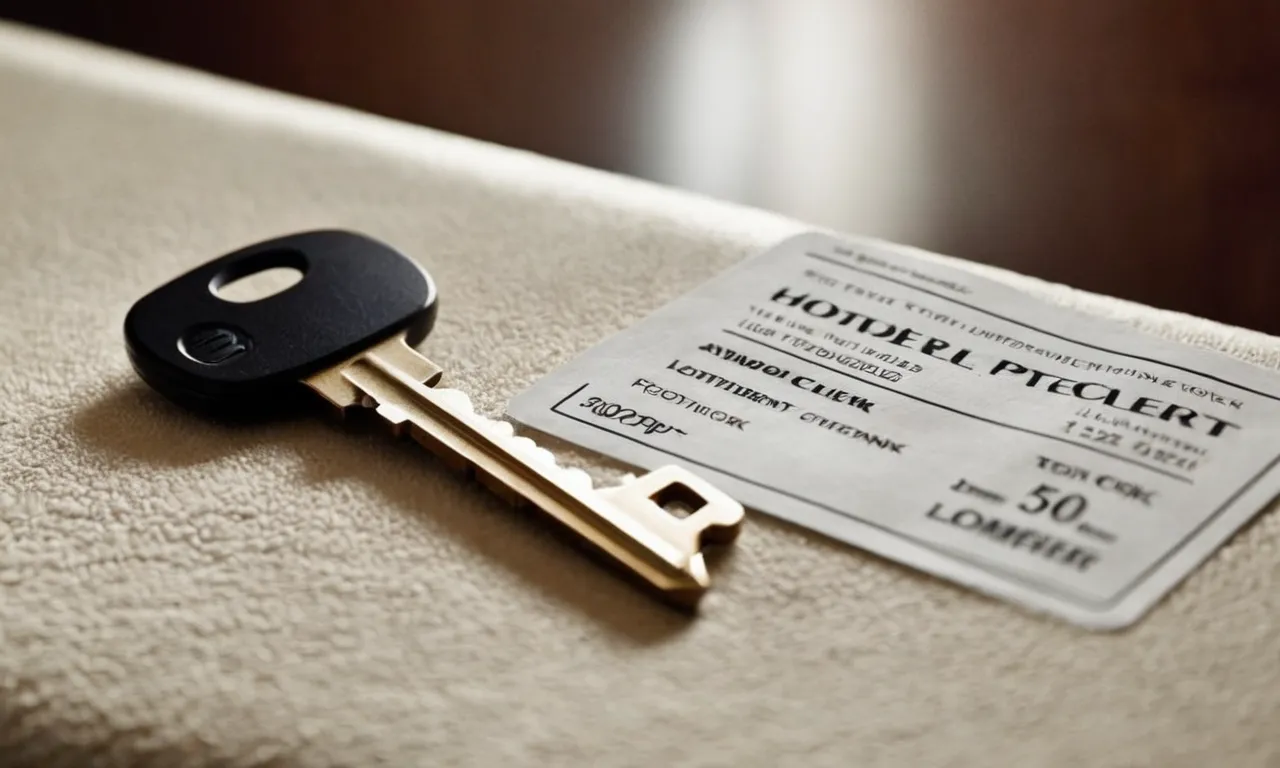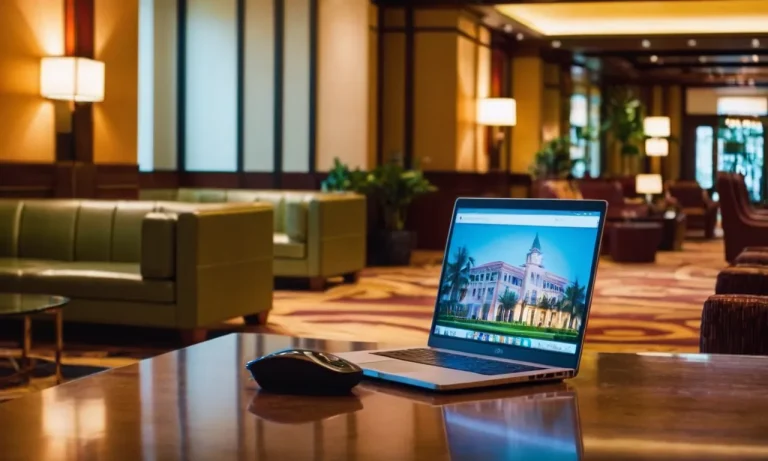How Long Does It Take To Get Incidentals Back From A Hotel?
Have you ever checked out of a hotel and wondered when you’ll get your incidental deposit back? It’s a common concern for travelers, as hotels often place a hold on your credit card for potential charges during your stay.
Understanding the process and timeline for receiving your incidentals back can help alleviate stress and ensure a smooth post-stay experience.
If you’re short on time, here’s a quick answer to your question: The time it takes to get incidentals back from a hotel can vary, but it typically ranges from a few days to a couple of weeks, depending on the hotel’s policies and your method of payment.
In this comprehensive article, we’ll delve into the details of hotel incidental deposits, explore the factors that influence the refund timeline, and provide tips to help you navigate the process efficiently.
Whether you’re a frequent traveler or planning your next vacation, this guide will equip you with the knowledge to understand and manage your incidental refunds effectively.
Understanding Hotel Incidental Deposits
What are Incidental Deposits?
When you check into a hotel, you’ll often be asked to provide a credit or debit card for an “incidental deposit” or “incidental hold.” This is a temporary hold or authorization on your card to cover any potential incidental charges you may incur during your stay.
Incidental deposits are separate from the room rate and taxes, and they serve as a security deposit in case you rack up additional expenses like room service, minibar purchases, spa treatments, or damages to the room.
The amount held can vary widely, from $50 to $500 or more, depending on the hotel’s policies and the nightly room rate. According to a survey by travel website RewardExpert, the average incidental deposit at major hotel chains in the U.S. is around $100 per night.
Common Incidental Charges
Incidental charges can cover a wide range of expenses beyond just the room rate. Some common incidentals that may be charged to your account include:
- Room service and minibar purchases
- Spa treatments or gym fees
- Parking or valet charges
- Laundry or dry cleaning services
- Pay-per-view movies or in-room entertainment
- Damages to the room or hotel property
- Smoking fees (if you smoke in a non-smoking room)
The incidental deposit is designed to ensure that the hotel can recoup these additional charges if you don’t settle your bill before checking out.
Hotel Policies and Practices
Hotels have different policies and practices when it comes to incidental deposits. Some hotels may require a flat-rate deposit, while others may base the amount on the nightly room rate or the length of your stay.
It’s also common for hotels to hold a larger deposit for guests paying with a debit card or cash, as opposed to a credit card. 😊 Many hotels will release the incidental hold within a few days after you check out, provided there are no outstanding charges.
However, according to a study by the American Hotel & Lodging Association, it can take up to 30 days for some hotels to release the hold, depending on their policies and the banking system. If you’re concerned about the incidental deposit or have questions about the hotel’s policies, don’t hesitate to ask the front desk staff.
It’s always better to be informed and understand the process upfront to avoid any surprises or headaches later on. For more authoritative information on hotel incidentals, you can check reputable travel websites like TripAdvisor or Hotels.com.
Factors Affecting the Refund Timeline
When it comes to getting your incidentals back from a hotel, the timeline can vary significantly depending on several factors. Understanding these factors can help you manage your expectations and plan accordingly.
Method of Payment
The method of payment you used during your stay plays a crucial role in determining how quickly you’ll receive your refund. If you paid with a credit card, the refund process is generally faster compared to other payment methods.
Hotels typically initiate the refund within a few days, and the funds are credited back to your account within 5-10 business days, depending on your bank’s policies. However, if you paid with a debit card, cash, or traveler’s checks, the refund process might take longer as it often involves additional verification steps according to NerdWallet.
Hotel’s Processing Time
Each hotel has its own internal procedures for processing refunds, which can impact the timeline. Some hotels are more efficient than others, and their processing times may vary. According to a study by SmarterTravel, the average processing time for hotel refunds is 3-5 business days, but it can take up to 14 days or longer in some cases.
It’s always a good idea to inquire about the hotel’s specific refund policy during check-in or check-out to set realistic expectations.
Bank Policies and Procedures
Once the hotel initiates the refund process, the timeline also depends on your bank’s policies and procedures. Different banks have varying timelines for processing refunds, which can range from a few days to several weeks.
Some banks may also have additional security checks or verification processes in place, further delaying the refund. It’s advisable to contact your bank and inquire about their refund processing timelines to better understand when you can expect the funds to be credited back to your account.
Additionally, banks may have different policies for refunds made to credit cards versus debit cards or other payment methods, so it’s essential to clarify this with your financial institution.
Typical Refund Timelines
When you check out of a hotel, you typically leave a deposit or credit card authorization for incidentals like room service, minibar charges, or damages. Getting that money back can take some time, and the refund timeline can vary depending on how you paid.
Cash or Debit Card Payments
If you paid for your incidentals with cash or a debit card, you’ll generally get your refund faster. Many hotels aim to process cash or debit refunds within 24-72 hours after checkout. However, it can still take 5-7 business days for the funds to show up in your account, according to Chase.
Some hotels may even refund cash deposits immediately upon checkout if there are no charges. But it’s a good idea to double-check the refund policy and timeline with the front desk staff before you leave. 😊
Credit Card Payments
For credit card payments, the refund process is a bit slower. Most hotels will release the hold on your credit card within 5-10 business days after checkout. But it can take up to 30 days for the funds to actually appear in your account, depending on your card issuer’s policies.
According to NerdWallet, major credit card issuers like Chase, American Express, and Capital One typically release hotel holds within 7-15 days. But some issuers like Citi and Discover may take up to 30 days. 🕰️
Third-Party Booking Platforms
If you booked your hotel through a third-party site like Expedia, Hotels.com, or Booking.com, the refund timeline can be a bit more complicated. These platforms often hold onto your incidental deposit for a few extra days to process refunds.
For example, Expedia states that it can take up to 30 days to refund incidental deposits, while Hotels.com says refunds may take 7-21 days. So you might have to be a bit more patient when dealing with third-party sites. But don’t worry, you’ll get your money back eventually! 💰
Tips for a Smooth Incidental Refund Process
Review Your Folio and Charges
Before checking out, it’s essential to review your hotel folio thoroughly. This document outlines all the charges incurred during your stay, including room rates, taxes, and incidentals. Double-check that all the charges are accurate and that you understand what each item represents.
If you notice any discrepancies or have questions, don’t hesitate to ask the front desk staff for clarification. According to a survey by Hotels.com, over 30% of travelers have experienced issues with incorrect charges on their hotel bills, so it’s crucial to be vigilant.
Communicate with the Hotel
If you’ve paid a deposit or had a hold placed on your credit card for incidentals, make sure to inquire about the refund process before leaving the hotel. Ask the front desk staff about their policies and timelines for refunding incidental deposits.
Many hotels aim to process refunds within 3-5 business days, but it can sometimes take up to two billing cycles (approximately 30-60 days) for the funds to appear back in your account, depending on your bank’s policies.
Don’t be afraid to politely ask for an estimated refund date and request a written confirmation or receipt for your records.
Follow Up if Necessary
If the expected refund date has passed and you haven’t received your incidental deposit back, it’s time to follow up with the hotel. Start by contacting the front desk or accounting department directly. Explain the situation calmly and provide any documentation or confirmation numbers you have.
If you don’t receive a satisfactory response, you may need to escalate the issue to a manager or the hotel’s corporate office. Don’t give up! According to a study by Consumer Reports, persistent follow-up can often resolve billing disputes in your favor.
Consider Travel Insurance
For added peace of mind, you might want to consider purchasing travel insurance, especially for longer or more expensive trips. Many comprehensive travel insurance policies cover situations where you need to dispute charges or seek reimbursement from hotels or other travel providers.
While it may seem like an extra expense, having this protection can save you a significant amount of time, stress, and money in the long run. Reputable travel insurance companies like Travel Insurance or Allianz Travel Insurance offer various plans tailored to your needs.
Remember, being patient, polite, and persistent can go a long way in ensuring a smooth incidental refund process. And if all else fails, you can always file a dispute with your credit card company or seek assistance from consumer protection organizations like the Better Business Bureau.
With a little preparation and follow-through, you can increase your chances of getting your incidental deposit back promptly and without any unnecessary hassle. 😊
Conclusion
Getting your incidentals back from a hotel can be a straightforward process, but it’s essential to understand the factors that influence the refund timeline. By familiarizing yourself with hotel policies, payment methods, and potential delays, you can better manage your expectations and ensure a hassle-free experience.
Remember to review your folio, communicate with the hotel staff, and follow up if necessary. Additionally, considering travel insurance can provide an extra layer of protection and peace of mind during your travels.
With the knowledge and tips provided in this article, you’ll be well-equipped to navigate the incidental refund process confidently, allowing you to focus on enjoying your trip and creating lasting memories.







